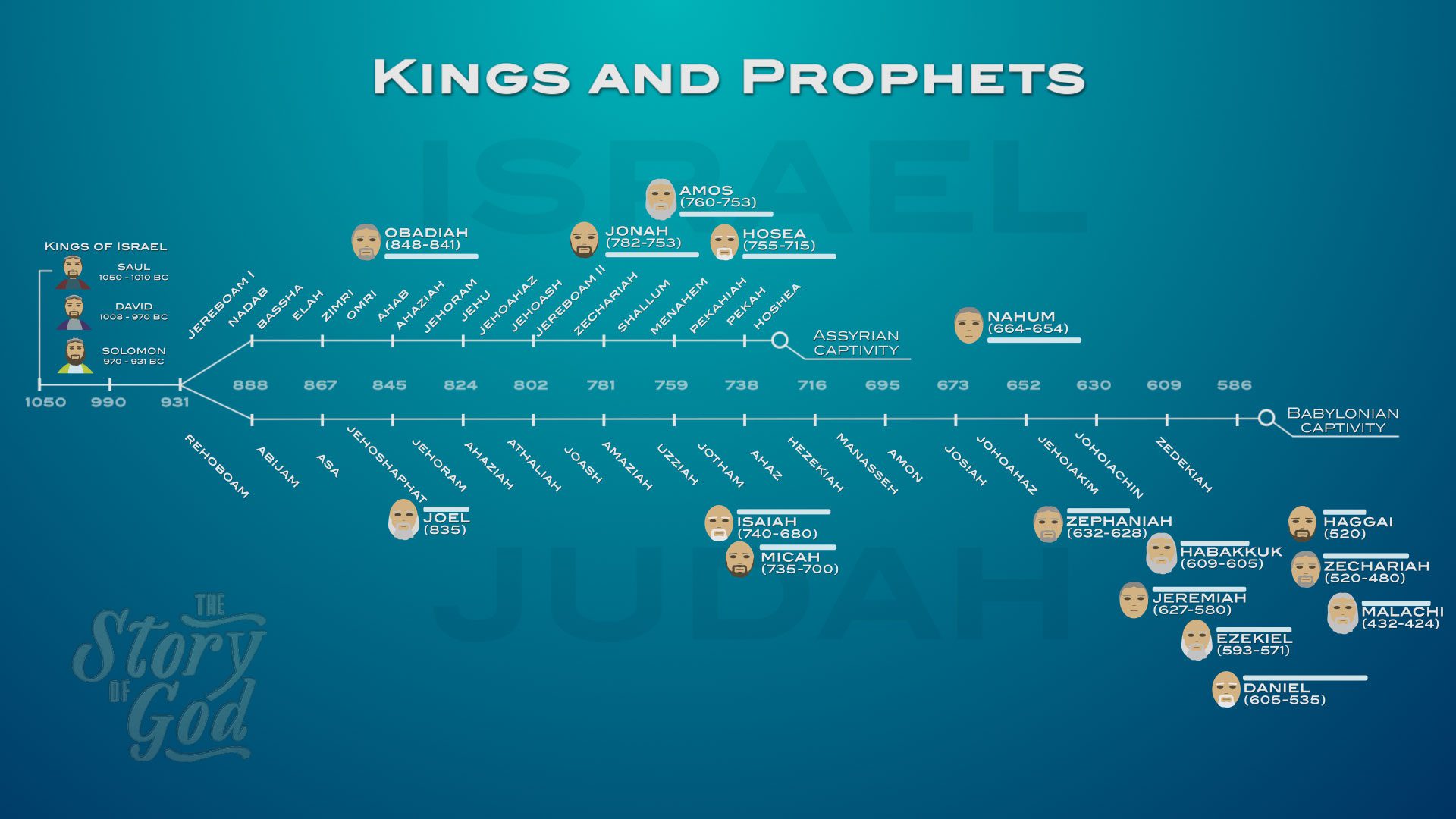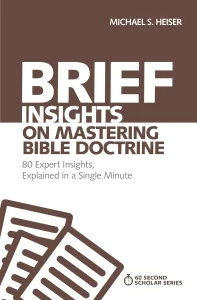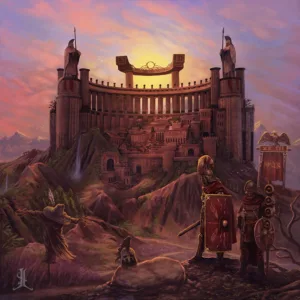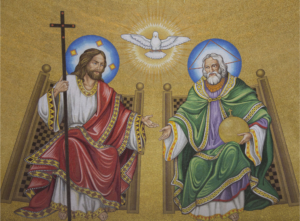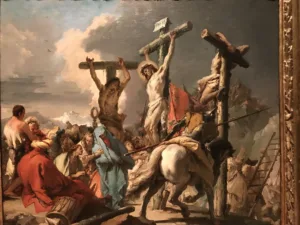To be sure Haggai was not written to us in the 21st Century. It was written about 2500 years ago. And yet, there is something for us to learn from a prophecy of that age. First let’s set some background.
What is a Prophet anyway?
The average Christian has little or no connection in any meaningful way with Prophets or prophecy today. Most people, both believers and nonbelievers, have a picture of someone who predicts the future under the direction of a supernatural spirit (hopefully God).
Well, that isn’t wrong per se, but it is wrongheaded for lack of thoroughness. Predicting the future was not and is not (if there are any prophets left) the primary ministry of the Prophet. Whatever predictive statements they made were a byproduct of the real purpose of their ministry.
I like the way Dr. Michael Heiser stated it.
Prophets were simply people who spoke for God— men and women who, at God’s direction, looked their fellow Israelites in the eye and told them they were being disloyal to the God to whom they owed their existence and who had chosen a relationship with them over everyone else on earth. Prophets told people the unvarnished truth and often paid dearly for it.[i]
An Israelite might wish that God had not sent the prophet to them. When God did, they were probably in trouble and needed to repent.
The prophet was not usually sent directly to the people. Instead, the prophet was generally sent to one in authority such as the king or the high priest, although in the case of Haggai, he was sent to both Zerubbabel, the governor and Joshua, the high priest. They were acting as proxies for the king of the Persians, Darius.
Why was Haggai sent?
The first verse of the prophecy of Haggai opens this way:
“In the second year of Darius the king, in the sixth month, on the first day of the month, the word of the Lord came by the hand of Haggai the prophet to Zerubbabel the son of Shealtiel, governor of Judah, and to Joshua the son of Jehozadak, the high priest: (Haggai 1: 1)
The first exiles began their return to Jerusalem and Judah from Babylon in 538 BC. Darius began to reign in 522 BC. The second year of his reign was, therefore, 521 BC. That means that approximately 17 years have passed, and the Temple was still not rebuilt.
The prophecy continues with:
2 “Thus says the Lord of hosts: These people say the time has not yet come to rebuild the house of the Lord.” 3 Then the word of the Lord came by the hand of Haggai the prophet, 4 “Is it a time for you yourselves to dwell in your paneled houses, while this house lies in ruins? 5 Now, therefore, thus says the Lord of hosts: Consider your ways. 6 You have sown much, and harvested little. You eat, but you never have enough; you drink, but you never have your fill. You clothe yourselves, but no one is warm. And he who earns wages does so to put them into a bag with holes.
7 “Thus says the Lord of hosts: Consider your ways. 8 Go up to the hills and bring wood and build the house, that I may take pleasure in it and that I may be glorified, says the Lord. 9 You looked for much, and behold, it came to little. And when you brought it home, I blew it away. Why? Declares the Lord of hosts. Because of my house that lies in ruins, while each of you busies himself with his own house. 10 Therefore the heavens above you have withheld the dew, and the earth has withheld its produce. 11 And I have called for a drought on the land and the hills, on the grain, the new wine, the oil, on what the ground brings forth, on man and beast, and on all their labors.” (Haggai 1:2-11)
Neglect for the things of God!
For 70 years the Judeans and citizens of Jerusalem had been exiled in Babylon. They had been in lament and despair the whole time. Or at least that’s what their cry was to the Lord in the psalms, like Psa 137.
It seems that upon release and return to their homeland they got busy with other things like getting on with their lives, planting seed, reaping harvests, building up their ruined homes, and marrying and being given in marriage. They let the things of God languish. It appears that they were like soil 3 in Christ’s Parable of the Sower. They haven’t been sent back into exile (yet). They were just leading ungrateful and unfruitful lives and were not experiencing the blessing of living in the presence of God.
It seems clear that the principle in play in Haggai’s prophecy is neglect of the house of the Lord while bolstering the individual’s own comfort and looking to his own house, results in a barren and unfruitful life for the individual. And it is accompanied by the curse of God on the land so that even the land becomes unfruitful.
In many ways those days were similar to these that we live in today. Let me explain.
The Plan of God – A Review
We humans tend to think very highly of ourselves. We generally are not warm to the idea that we have responsibilities. Even when we say we believe in a sovereign God who created everything that exists from nothing, we are not naturally receptive to the idea that we might have a responsibility to that God, day by day.
The Bible presents a very different view of things. Everything that exists is here because God planned it and has a purpose for it. Superfluity is NOT a characteristic of God.
It is outside the scope of this article to try and give an exhaustive explanation of that plan. I just want to hit some highlights that will illuminate why a prophecy written 2500 years ago might hold relevance for us, living today:
- In Gen 1: 26-31 God introduces us to the idea that he wants to created a human family of co-rulers that will share governing responsibilities with Him.
- He had already created a contingency of heavenly beings (we call them angels) to be a branch of the co-ruling family. Some of them rebelled from cooperation with the plan (we call them demons; their leader is called the Devil.) One of them, Satan, created havoc in the Garden and convinced the first humans to reject the offer of God and strike out on their own. Death entered the world and Man was expelled from the Garden.
- In Gen 6:1-7 we see another rebellion against God’s plan. The Sons of God cohabitated with the daughters of man. The Lord regretted that he had made man on the earth, and it grieved him to his heart. That rebellion brought on a worldwide flood and God started all over with Noah and his family. But God reiterated the original covenant with Noah and his family.
- In Gen 11:1-9 we see more rebellion. This time the result was the confusing of language, the scattering of the nations throughout the earth, and the releasing of the nations to their own devices and their own “gods”.
- But these were mere delays of the plan. In the next chapter (Gen 12) God calls Abram and makes a covenant with him to build the family. Abram and Sarai became Abraham and Sarah, the covenant was established with them based on their faith in God’s promise and the Jewish nation was born, set aside for God. The destiny of that nation was to go out and convince all the Nations that God had scattered (the Gentiles) to return to God.
- The rest of the Old Testament is a record of how Israel failed to conform to the plan.
- So, Yahweh took it upon himself to fulfill the covenant himself on behalf of those who would be faithful. He incarnated, in the person of Jesus Christ and visited Earth to fulfill the plan.
I cannot cover the full scope the differences between the approach to God in the past and in the present. It takes the entire Bible to cover all the differences. However, I entreat you to mull over what you do know about how God’s people approached God under the Old Covenant. There were holy places, set aside for God’s presence.
I consider two of the biggest and most significant differences between then and now is the dwelling place of God and where we find holy ground.
A Difference Between the Old and New Covenants
Old Covenant Synopsis
Before Christ, the Messiah, God placed his presence amid his people by means of stone altars on mountain tops and an elaborate tent built to exacting specifications. The tent was set up in the center of the encampment of his people. Finally, he allowed a magnificent Temple to be built that was built on Mount Moriah in the City of Jerusalem to be where he descended to be amid his people.
These artifacts, built to God’s specifications, were the dwelling places (on earth) for Yahweh. His presence in them made those objects and the ground they stood on holy ground. And there was always some separation between God and his people, in terms of proximity, preparation, and rules of engagement for entering God’s presence.
The New Testament is the record of how God took things back into his own hands and fulfilled the covenant on behalf of an undeserving people who yet would trust him, follow him and be loyal to him.
New Covenant Differences
Consider these passages of scripture pertaining to the New Covenant.
From the author of Hebrews (I want to meet this guy on the other side. He nailed it.)
“…but Christ is faithful over God’s house as a son. And we are his house, if indeed we hold fast our confidence and our boasting in our hope. (Heb 3:6)
Or from Paul to the Corinthians:
“9 For we are God’s fellow workers. You are God’s field, God’s building.
10 According to the grace of God given to me, like a skilled master builder I laid a foundation, and someone else is building upon it. Let each one take care how he builds upon it. 11 For no one can lay a foundation other than that which is laid, which is Jesus Christ. (1 Cor 3:9-11)
“16 Do you not know that you are God’s temple and that God’s Spirit dwells in you? 17 If anyone destroys God’s temple, God will destroy him. For God’s temple is holy, and you are that temple. (1 Cor 3:16-17)
“Or do you not know that your body is a temple of the Holy Spirit within you, whom you have from God? You are not your own, 20 for you were bought with a price. So glorify God in your body. (1 Cor 6:19-20)
And again, to the Ephesians:
“So then you are no longer strangers and aliens, but you are fellow citizens with the saints and members of the household of God, 20 built on the foundation of the apostles and prophets, Christ Jesus himself being the cornerstone, 21 in whom the whole structure, being joined together, grows into a holy temple in the Lord. 22 In him you also are being built together into a dwelling place for God by the Spirit. (Eph 2:19-22)
Give me a minute and I will show you why the following passage is important in this discussion.
“Truly, I say to you, whatever you bind on earth shall be bound in heaven, and whatever you loose on earth shall be loosed in heaven. 19 Again I say to you, if two of you agree on earth about anything they ask, it will be done for them by my Father in heaven. 20 For where two or three are gathered in my name, there am I among them.” (Matt 18:18-20)
We live in the New Covenant, promised through Jeremiah in (31:31-34) and Ezekiel in (37:26-28).
Today it is not a temple built of wood and stone. It is a temple of flesh and blood. We each are “stones” in that temple, both as unique “stones” in the building and collectively as the Temple (the Church).
Since Christ, God no longer resides with his people in tents or brick-and-mortar buildings, separated and isolated away from His people. Now, God manifests his glory in the lives of the people he has called to be “in Christ”. This is where God dwells and is glorified.
And here is the significance of Matt 18:18-20 (as I promised you).
Christ confirms in the passage, when his people gather in his name he is in their midst. With Christ in their midst, they become the holy ground that marks his presence. At least, this is the intent.
“For we are his workmanship, created in Christ Jesus for good works, which God prepared beforehand, that we should walk in them. (Eph 2;10)
Application for the 21st Century
Not much has changed since Haggai. The people of God then, as the people of God today, have a strong tendency to metaphorically place God on a shelf and go on about their lives.
However, we have moved from the types and shadows of the Old Covenant to the reality that they were pointing to in the New Covenant.
“Therefore, we must pay much closer attention to what we have heard, lest we drift away from it. 2 For since the message declared by angels proved to be reliable, and every transgression or disobedience received a just retribution, 3 how shall we escape if we neglect such a great salvation? (Heb 2:1-3)
How do we neglect our great salvation? By not taking seriously the new relationship we have with Yahweh.
It seems that too many preachers are more interested in filling pews than in calling people to a life of repentance in Christ. In the attempt to be “relevant” and “seeker friendly” they put on a show with a very cheap price of admission.
Let me explain. Becoming found to be in Christ is not a matter of cruising through life doing whatever we want and deciding to pick up Jesus along the way as a get-out-of-jail-free card. That’s not the way it works.
19 You believe that God is one; you do well. Even the demons believe—and shudder! 20 Do you want to be shown, you foolish person, that faith apart from works is useless? 21 Was not Abraham our father justified by works when he offered up his son Isaac on the altar? 22 You see that faith was active along with his works, and faith was completed by his works; 23 and the Scripture was fulfilled that says, “Abraham believed God, and it was counted to him as righteousness”—and he was called a friend of God. (Jam 2:19-23)
We need to be attending to the life of God within us, that we have been freely given or we risk experiencing the same lack of fruitfulness that the returning exiles experienced in Haggai’s day and more so because while they followed the types and forms, we follow the reality they pointed toward which gives us the greater responsibility. While we are not justified by works, our works validate that we are justified by faith.
We do this by valuing our relationship with Christ above all else. We adopt a curiosity about Him. We study to know Him a fully as we are able. We are not satisfied to mere know about him. We desire to know him and be like him. These things do not happen without effort and obedience on our part.
15 Do your best to present yourself to God as one approved [by testing], a worker who has no need to be ashamed, rightly handling the word of truth. 16 But avoid irreverent babble, for it will lead people into more and more ungodliness, 17 and their talk will spread like gangrene. (2 Tim 2:15–17)
[i] Heiser, Michael S.. The Unseen Realm: Recovering the Supernatural Worldview of the Bible (p. 232). Lexham Press. Kindle Edition.
Clear comprehension of what the events in the Bible mean isn’t a lost cause and doesn’t require a PhD. This book is your guide to quickly deciphering key doctrines, providing expert observations so that you can comprehend more of Scripture than you ever have before.
There’s a lot to think about in the Bible. We believe things on the basis of what it says, but Scripture doesn’t spell everything out with equal clarity. For instance:
- How should we really understand the idea of the Trinity or the concept of Hell?
- Can unbelievers still please God?
- Do the first chapters of Genesis allow for more than one interpretation of the creation?
What the Bible says requires deep thought in order to come to conclusions about our Heavenly Father. If all you know of Scripture is Bible characters and stories, you’re missing its life-changing teachings. But you don’t have to become a theologian yourself to participate in mature reflections on its messages.
In Brief Insights on Mastering Bible Doctrine (part of the 60 Second Scholar series), Michael S. Heiser distills the research of biblical scholars down to 80 easy-to-grasp key teachings of Scripture that:
- Help readers learn how to think carefully and theologically about what the Bible says.
- Clear up common misconceptions about the Bible’s truths.
- Cover the spectrum of Christian doctrine, succinctly drawing meaning from the Bible independent of denominational or political traditions.
With topics ranging from how the modern Bible came about to what God’s Word tells us about the end times, this introdoctrine will give you the insights you need to hold your own in even the most animated biblical discussions.

Logos Bible Software
The Logos Bible Study app is a powerful Bible study and sermon prep platform. It allows you to study Scripture, commentaries, devotionals, Bible dictionaries, and more from your computer, tablet, or phone. If you want to know the Creator of the Universe intimately, you want this app.

Elevated Faith
Are you looking for apparel or swag? We picked Elevated Faith because of the diversity of their offerings. They offer some great ideas for gifts for others and treats for yourself.

